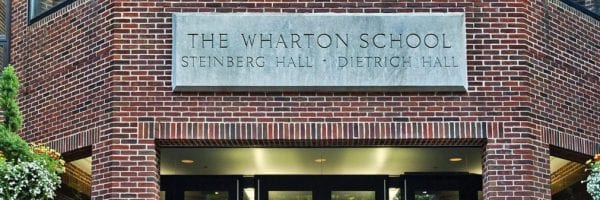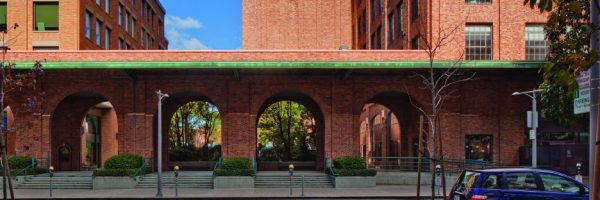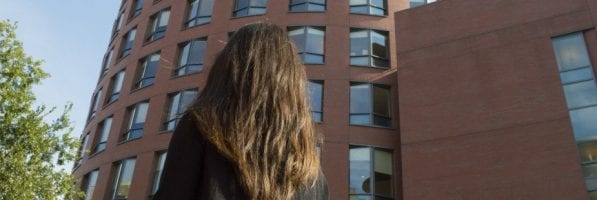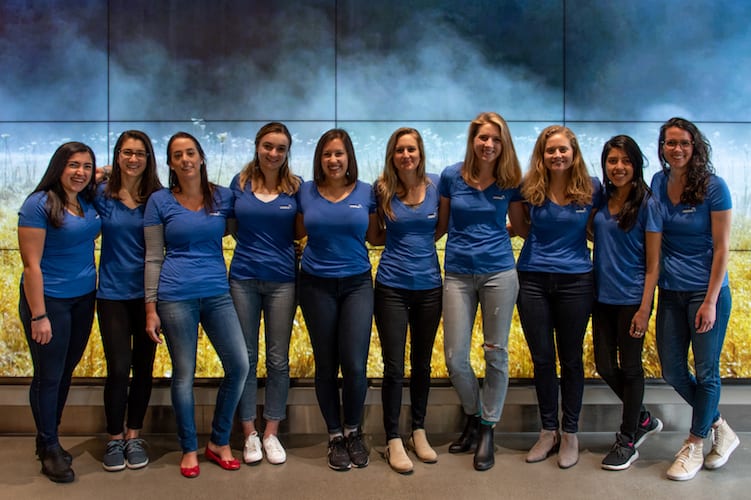The Top Deferred Enrollment MBA Programs

In the past several years, we’ve seen more and more leading business schools offering deferred enrollment MBA programs.
Traditionally, full-time work experience has been a requirement for acceptance into a leading MBA program, with students averaging five years of professional experience at the time they begin their graduate studies.
Most deferred enrollment programs still require work experience—the difference is that students can gain this experience after they earn admission. Deferred enrollment MBA programs guarantee college seniors (and sometimes graduate students) a spot in their MBA programs, allowing them to enroll two to five years after they graduate from college. This allows students to focus on their work experience with their MBA plans already in place.
Read on for information about deferred enrollment programs at:
- Berkeley Haas
- Chicago Booth
- Columbia Business School
- Harvard Business School
- MIT Sloan
- Northwestern Kellogg
- Stanford GSB
- UVA Darden
- The Wharton School
- Yale School of Management
How Deferred Enrollment Programs Work
“This type of program is for those who know that an MBA program is something they want to pursue in the future. Not directly after their undergraduate degree (in most cases), but a couple of years later,” explains Alex Brown, an MBA admissions expert at Clear Admit.
Ambitious undergraduate students apply to b-school during their senior years and then receive a promise of a seat in a future cohort. Typically, they are required to gain two to five years of full-time work experience between being accepted and starting an MBA. Once they do enroll, they join the same MBA cohort as those admitted through the traditional application process.
“Applying and gaining admission during college helps reduce the uncertainty of their plan going forward. So rather than entering an analyst program at a consulting firm, for example, with the hope of gaining admission to a top MBA program after a few years, new graduates can enter the program knowing they have an MBA option already,” says Alex. “Of course, it doesn’t stop them from changing their minds, or pursuing other MBA options and forgoing the early admission.”
These deferred enrollment programs are ideal for candidates with established leadership skills. Typically, candidates have outstanding internships, strong academic credentials, and high test scores when they apply. “Also, these candidates are still typically early in their career arch when they start their MBA programs. But, it makes sense if they are focused and really understand how the MBA program will help develop their career further,” explains Alex. “It’s good for candidates with focused career goals.”
Additionally, it’s worth noting that deferred admissions MBA programs are open to applications from students of all academic backgrounds. In addition to the finance, business, and economics majors, who are well represented in the traditional MBA applicant pool, deferred enrollment programs welcome those from a STEM or humanities backgrounds. Whatever their major, the key for applicants is to have a solid plan for the future and a good sense of how an MBA fits into that plan.

Deferred Enrollment Programs at a Glance
So, what are some of the top deferred enrollment programs and how do they vary?
At a glance, the structure of most deferred enrollment MBA programs are similar. All but Yale SOM are two years in length and place students in the same cohort as the full-time MBA. On the other hand, the Yale Silver Scholars program is three years in length, with the first and third year being the same as the standard MBA and the second year being an extended internship. The reason behind this difference is that the program accepts candidates directly after their undergraduate career without any work experience.
The rest of the programs require that students gain two to five years of full-time work experience before they start their MBA studies. However, in some cases, work experience is not required if the student is currently completing another graduate degree (this is the case for Stanford’s program).
“Generally, the students co-exist in the same program” as those admitted through the traditional process, explains Alex. “Younger students might have more energy and enthusiasm, older candidates might have more experience and insights. It can become a great blend for an academic experience.”
Another key distinction is eligibility; the Haas Accelerated Access and Wharton Moelis programs are only open to UC Berkeley and University of Pennsylvania students, respectively. In 2019, Wharton added another deferred admissions program for students from any institution, not just Penn. MIT Sloan allows MIT students with an undergraduate GPA of 4.25 to waive the GMAT, and UVA Darden, Haas, and Wharton all offer scholarships for their deferred programs.
Deadlines for each of these programs tend to fall April, around the Round 3 MBA application deadlines.
Inside the Deferred Enrollment MBA Programs at Leading Business Schools
Here’s a deeper look at the details of each school’s deferred enrollment MBA structure, eligibility, and application requirements.
Berkeley Haas Accelerated Access
The Berkeley Haas Accelerated Access program is currently only open to UC Berkeley undergraduate and graduate students in their final year of study—though there are plans to expand to the rest of the University of California and beyond in the future. The program offers early conditional admission into the Full-Time MBA program with the ability to defer for two to five years to gain professional experience. There are two application deadlines—one in April and one in June—with an application process very similar to the full-time MBA program, except the application fee is waived.
Application requirements include the application form, university transcripts, two short essays, two recommendations, a resume, and the GMAT or GRE. Interviews are then conducted by invitation only. Accepted candidates must make a $500 deposit.
To celebrate the launch of Accelerated Access, up to five $100,000 scholarship awards will be available for students applying in 2020. Upon matriculation, candidates will be eligible for other scholarships and dual degree programs.
Chicago Booth Scholars Program
The Chicago Booth Scholars program is a deferred MBA program for promising candidates looking to secure a seat in a future Chicago Booth full-time MBA cohort. It’s open to undergraduates from any institution in their senior year, and grants admits a two to four-year deferment before they begin the full-time MBA program. While working full time, students have the opportunity to engage with Booth and explore the University of Chicago community. If candidates prefer to continue working after four years, they have the opportunity to enroll in the Evening or Weekend MBA programs.
Applications are due in April, and are similar to the full-time MBA application. Application requirements include a data form, short answers, an essay, two recommendations, unofficial transcripts (official copies required of admitted students), and professional resume. International students must take the TOEFL, unless their undergraduate degrees were conducted in English. All applicants must take the GMAT or GRE; there is no preference given to either test. Interviews are then conducted on an invitation only basis.
Columbia Business School Deferred Enrollment Program
The Columbia Business School Deferred Enrollment program is open to undergraduate and Master’s students who apply during their final years of study. (Students enrolled in Ph.D. programs, law school, or medical school are not eligible.) Once accepted, they can take two to five years to enter the workforce, and start the full-time MBA program when it’s right for them. To begin the program, candidates simply send the school a letter of intent to Columbia indicating whether they want to enroll in January (16-month program) or August (20-month program with summer internship). Admitted students gain access to conferences, events, and school-wide resources prior to matriculating.
Applications are due by mid-April, and requirements include a data form, short answer questions, an essay, two recommendations, academic transcripts, and professional resume. All applicants must take the GMAT, Executive Assessment, or GRE within three weeks of applying. Interviews are then conducted on an invitation only basis. CBS releases decisions on a rolling basis, within two weeks of the interview.
In 2019, 114 candidate were admitted to the CBS Deferred Enrollment Program. Their GMAT scores ranged from 640-790, and GPAs ranged from 2.92-4.0. Forty-nine schools and 11 countries were represented in this incoming class.
Harvard Business School 2+2 Program
Harvard’s 2+2 program is perhaps the best-known deferred MBA. Candidates apply in their final year of undergraduate or graduate school, then spend a minimum of two years (maximum of four) working full-time before they begin Harvard’s full-time, two-year MBA program. This program is open to students who plan to work in the public, private, or nonprofit sector, with preference given to applicants planning to work in an operating company (tech, manufacturing, consumer goods, retail, industrials, etc.), from a lower socio-economic background, going into a technically demanding role, or pursuing entrepreneurship. Students enrolled in Ph.D. programs, law school, or medical school are not eligible; they should apply through the regular MBA admissions process.
The application is essentially the same as for the traditional MBA program, though the application fee is $100 instead of $250. The application fee is waived for active duty military applicants. The admissions deadline is in April. Candidates may enter the full-time MBA program once they have met work experience requirements.
More than 1,400 candidates applied to be a part of the Class of 2023, and 115 students ultimately committed to the program. Their GMAT scores ranged from 590-790, and their average GPA was 3.79.
Kellogg Future Leaders
Northwestern Kellogg’s Future Leaders program is open to any undergraduate student in their final year of school, as well as Master’s students who began their graduate programs directly after undergrad. Students enrolled in Ph.D. programs, law school, or medical school are not eligible; they should apply through the regular MBA admissions process.
Successful applicants defer their enrollment at Kellogg for two to five years, during which time they are expected to gain relevant work experience. Candidates may also reassess which MBA program to join; while applicants are accepted into the full-time two-year MBA program, they can also choose the Evening & Weekend or One-Year program. They may also expand their plans to consider the JD-MBA or MMM, though those require admission to the other Northwestern schools.
The application requires brief essays, a recommendation, and an interview by invitation; the TOEFL and GMAT/GRE are also conditional requirements. Non-native English speakers must take the TOEFL, unless their undergraduate studies were conducted in English. Northwestern undergraduates do not have to take the GMAT/GRE, but it is required for all other students. While there is no application fee, admitted candidates need to make an initial deposit of $500, then $500 for every year of deferment; these funds ultimately apply to tuition when they matriculate.
MIT Sloan MBA Early Admission
The MIT Sloan MBA Early Admission program is open to any exceptional undergraduate student during the year that they are graduating. Graduate students without full-time work experience may also apply. Between being accepted and starting the program, candidates are expected to seek two to five years of full-time work experience.
Applications are due in April, and requirements include a data form, cover letter, video statement, two recommendations, academic transcripts, and professional resume. All applicants must take the GMAT or GRE, but MIT students can waive the GMAT or GRE if they have a GPA above 4.2. Interviews are then conducted on an invitation-only basis. The application fee is waived for all candidates.
Stanford GSB Deferred Enrollment
The Stanford GSB Deferred Enrollment program is open to undergraduate students who want to begin their MBAs immediately after their senior year. However, students are encouraged to defer for one to three years to gain work experience (two-year deferrals are most common). They can apply during any of GSB’s three application rounds, and can choose which year’s MBA cohort they would like to enter. If they decide to defer for one to two years, they can apply for specific fellowships the year before starting their full-time MBA.
Those eligible for deferred enrollment have their application fee reduced to $100.
UVA Darden Future Year Scholars Program (FYSP)
The UVA Darden FYSP program is open to undergraduate students in their final year, as well as Master’s students. Candidates can apply in January, April, or August. Once admitted, they then go on to gain two to four years of work experience while also gaining access to the Darden alumni community for mentorship, networking, and individualized career support. Then, once ready, candidates join the regular full-time MBA program.
The application requires a GMAT, GRE, MCAT or LSAT score, but applicants are encouraged to take the GRE or GMAT before matriculating. Applicants must also submit a resume, transcripts, an essay, and two letters of recommendation. While there is no application fee, admitted candidates need to make a deposit of $500 for every year of deferment; these funds ultimately apply to tuition when they matriculate.
Wharton Advance Access Program
Undergraduate seniors and graduate students from any institution outside of Penn can apply early for the Wharton MBA through the Advance Access Program. Accepted applicants receive special professional development and career services support, as well as access to the Wharton community including annual retreats and mentoring. Applicants may apply in their senior year during Round Three of the MBA admission timeline, and are evaluated similarly to the overall MBA applicant pool. Candidates defer for two to four years of work experience, and then join the regular two-year, full-time MBA program when they’re ready.
University of Pennsylvania undergraduates, specifically, can apply through the Wharton Moelis program. The benefits mirror those of the Advance Access program, with the added potential for a $10,000 yearly fellowship (or more, based on merit).
While the application fee for the Moelis program is waived, applicants through the Advance Access program must pay a reduced application fee of $100. The application requirements for both options include unofficial transcripts, GMAT or GRE score, a resume, two letters of recommendation, two essays that are the same as the general MBA application, and interviews (Team-Based Discussion & one-on-one). Admitted candidates through either program need to make a deposit of $1,000 at the beginning of June of the year they are accepted, and then another deposit of $1,000 when they decide to matriculate. The school also expects yearly affirmation of intent to attend the program, as well as verification of work experience.
Yale SOM Silver Scholars
Students admitted to the Yale Silver Scholars program start their MBA studies immediately after college graduation. Candidates spend one year completing the core curriculum, and then undertake an extended full-time internship in year two. Then, during the third year, they return to Yale SOM to complete their degree with MBA elective courses. Students are fully integrated into the Yale SOM MBA class, but they have special programming and career development support that’s tailored to them. Candidates apply during their senior years of college.
Applicants complete the same online application as regular enrollment candidates, with nuances in the Work Experience and Activities sections of data form. Yale notes that only college seniors are eligible to apply, and they must submit two letters of recommendation. If invited to interview, candidates will meet with one or more members of the Silver Scholars committee.
This article has been edited and republished from its original source, Clear Admit.
Stanford Reigns, Dartmouth Surprises in New Bloomberg MBA Rankings

For the second-consecutive year, the Stanford Graduate School of Business earned the top spot in Bloomberg Businessweek’s annual U.S. business school ranking. However, a new entry near the top of the ranking may be a slight surprise, with the Dartmouth College Tuck School of Business claiming the second spot.
Continue reading…Diversity Rising for the Wharton MBA Class of 2021

With an increase in female students and U.S. underrepresented minority students, the new Wharton full-time MBA Class of 2021 represents an even higher standard of diversity for one of the world’s highest-regarded business schools.
Best Real Estate MBAs in the Northeast

While a career in real estate is not one of the most popular options for MBA graduates, it is a solid choice. The U.S. real estate industry pulls in over $166 billion in revenue each year, and markets in India, China, and other emerging economies are poised to expand. So, the question is, if you’re looking to go to school in the Northeast, where are the best MBA programs to help build a career in the industry? We’ve highlighted five of our favorite Northeast real estate programs below.
The Best Northeast Real Estate MBA Programs

The NYU Stern School of Business offers full-time MBA students a chance to specialize in real estate. According to the school, it “provides rigorous training in the development, investment, and financing of real estate projects.” Students who choose the specializing are taught to think strategically about real estate in primary and secondary markets including the legal, taxation, and regulatory environments they’ll encounter.
Real estate MBA curriculum includes classes such as:
- Real Estate Development and Entrepreneurship
- Real Estate Transactions
- Real Estate Investment Strategies
- Urban Systems
Real Estate Outside the Classroom:
- Center of Real Estate Finance: Established in 2012, the Center is dedicated to expanding the School’s course offerings and career services in real estate. It’s open to both MBAs and undergraduates alike and offers monthly events, research and more.
- MBA Real Estate Club: The Stern Real Estate Club (SREC) offers guest lectures, panel discussions, mixers, site visits, and case competitions for MBA students interested in expanding their real estate experience and insight.

The Georgetown University McDonough School of Business also offers a specialization in real estate for MBA students, which can include an intensive learning experience (ILE) in real estate development. ILEs are elective courses that offer client-centered work and experiential learning opportunity off campus in a concentrated time format.
MBA students interested in real estate can take courses in:
- Real Estate Private/Public Equity
- Real Estate Private/Public Debt
- Negotiations
- Fixed Income Analysis
Real Estate Outside the Classroom
- Steer Center for Global Real Estate: The Steers Center “offers students unparalleled access to the real estate industry at a global level.” Students gain hands-on experience with the D.C. real estate market through a range of activities from alumni mentoring to internships, job contacts, and more.
- Real Estate Industry Career Coach: Georgetown offers a career coach with specific industry knowledge and relationships in real estate. This career coach will help MBA students with their resume, cover letter, mock interviews, and networking strategy.

At The Wharton School, MBA students can major in real estate. This major includes two required courses in real estate investment and real estate development. The goal of the major is to “prepare students to be leaders in the real estate industry” and provide the necessary quantitative and qualitative tools to be successful. Offered since 1985, the major has grown in scope and size over the years.
Additional courses in real estate that Wharton MBA students can enjoy:
- Global Real Estate: Risk, Politics, and Culture
- Urban Real Estate Economics
- Real Estate Law
- Real Estate Entrepreneurship
Real Estate Outside the Classroom
- Samuel Zell & Robert Lurie Real Estate Center: Each year, the Real Estate Center sponsors conferences, seminars, and special programs for students and faculty interested in real estate. Established in 1983, it promotes excellence in real estate education and research.
- Wharton Real Estate Club: The Wharton Real Estate Club provides career development, mentorship, and networking opportunities for students at Wharton. Of particular note are the treks and tours that allow students to meet prospective employers, visit project sites, and gain first-hand experience.

The Columbia Business School’s MBA Real Estate program “provides students an unparalleled opportunity to expand their entrepreneurial skills while focusing on real estate finance and investment management.”
The program encourages students to view real estate as both a physical and financial product by emphasizing a blend of theory and practice. Throughout the curriculum, students work on 65-plus proprietary real estate business cases taught by real estate professionals.
The real estate curriculum differs every term, but it includes courses such as:
- Real Estate Finance
- Real Estate Transactions
- Real Estate Portfolio Management
- Social Impact Real Estate Investing and Development
Real Estate Outside the Classroom
- Paul Milstein Center for Real Estate: The Center for Real Estate integrates the theoretical and practical knowledge of real estate. It offers regularly hosted events including panel discussions, conferences, alumni career breakfasts, and symposiums
- Fellowships & Scholarships: Uniquely, Columbia offers multiple fellowships and scholarships for MBA students interested in real estate. Awards can be as much as $50,000 a year and are both merit-based and need-based.

Full-time MBA students at the Rutgers Business School can customize their education with a real estate concentration. In total, students who choose this path will take six courses in real estate including strategic management. They can also pursue a dual concentration in finance and real estate, which requires them to take a course in aggregate economic analysis.
Other potential real estate courses that MBA students can take, include:
- Real Estate Finance
- Real Estate Capital Markets
- Market Analysis and Valuation
- Property Management and Real Estate Investment Management
Real Estate Outside the Classroom
- Center for Real Estate: The Rutgers Center for Real Estate is a dynamic hub for students, academics, and professionals. It aims to educate, research, and exchange ideas on real estate. Currently, more than 95 real estate professionals lend their influence to the Center.
- Rutgers Real Estate Club: The Club is a “place for people interested in real estate, internships, and everything business. It brings together experienced speakers for a variety of events and opportunities.
Penn Wharton Entrepreneurship Startup Challenge Winner Revealed

The 2018-19 Penn Wharton Entrepreneurship Startup Challenge took place on May 3 with 27 teams from across Penn to compete for a chance to win $135,000 in cash and prizes. Eliot Ingram, who has more than 21 years of experience in MBA admissions and is the founder of Clear Admit, headed out to Wharton’s Huntsman’s Hall to experience the event first hand.
Here’s what his experience was like.
Choosing the Finalists
The morning was taken up by 27 semi-finalist teams presenting in front of a panel of judges. From there, the teams were narrowed down to eight finalists who would present in the afternoon. When Ingram arrived at 1:30 p.m., he was just in time to hear the final pitches. Each team was given about six minutes to present and then had about 12 minutes to answer questions from four judges, all of whom had experience as venture capitalists.
Team Presentations
According to Ingram, the teams gave high-quality presentations. Compared to other early-stage investor conferences, Igram felt these teams were competitive, and it was clear Penn Startup venture did a great job coaching each team through the process.
“They each did a great job of conveying the key parts of an investor pitch,” he said. “In addition, the management teams seemed to be a good fit for the business ideas they were presenting. Furthermore, each of the teams did a good job of answering the questions posed by the judges.”
The results were especially impressive given the tight time restriction for each pitch. The teams had to choose what to focus on and make a good argument all in six minutes. Most teams focused on the market size, problem, their solution, and why their team had a competitive advantage rather than financial projection or exit strategies, which must have been a deliberate decision.
The Eight Competitors
- Aerate: Aerate is an innovative air conditioning unit that is 20 times more efficient than current air conditioners. Given the vast market for air conditioning, the rising middle class in India, and the harm that current air conditioners do to the environment, they offered a compelling, scalable tech solution that met a broad market while limiting the environmental impact (team members: Spencer Collins, Jake Fine, Ashwin Kishen, Yann Pfitzer, Conner Sendel, Sam Weintraub).
- Strella Biotech: Strella Biotech offers an innovative and patented way to help fruit packers minimize food waste and maximize produce quality. They do this by using biosensors that measure the ethylene in fruit in order to determine which fruit is ripe and needs to be taken out of the warehouse and sold in the market (team members: Katherine Sizov, Malika Shukurova, Reginald Lamaute, Zuyang Liu).
- Minimize: Minimize is a wearable device that counteracts hand tremors using the same technology that allows buildings to survive earthquakes. It can reduce tremors by up to 95 percent for Essential Tremor and Parkinson Disease patients (team member: Maanav Narula).
- Halo: Halo is a digital monitor attached to taxis or Uber/Lyft cars, which allows advertisers to offer location-enabled digital ads while providing the driver with incremental revenue (team members: Kenan Saleh, Faizan Bhatty, Nabeel Farooqi, Ryanne Fadel).
- Clove: Clove is a shoe design company that creates a shoe customized for health care professionals who spend a lot of time on their feet walking around. Their idea is to build a brand in the health care industry and have brand devotion be the key barrier to entry (team members: Joe Ammon, Jordyn Amoroso, Paula Belatti).
- #PeriodPainFree: #PeriodPainFree offers a women’s health solution based on Chinese herbal medicine and modern technology. It’s a personalized solution to help the 80 percent of women who experience period pains (team members: Lulu Ge, Nicole Glathe).
- Aavrani: Aavrani offers a premium skincare product line inspired by India’s ancient beauty rituals. One of the team members had experience growing a skin care product line from $3 million to $50 million, so they had the expertise needed to deliver clean, non-toxic products. (Team members: Rooshy Roychoudhury, Justin Silver, Nina Davuluri)
- Sigo Insurance: Sigo Insurance offers an auto insurance product tailored for non-traditional or high-risk customers. The company brings the insurance process online to reduce operating costs and remove predatory fees (team members: Nestor Hugo Solari, Julio Erdos).
Long Day
Eight pitches over 2.5 hours is a lot of information over a long time, which was challenging to handle and remain engaged.
“To be honest, while all of the presentations were quite good, after about an hour of listening to three pitches, my mind was getting fatigued with the amount of information being presented,” Ingram remembers. “In fact, I think that the first three teams had a decided advantage in terms of maintaining audience interest, particularly since the first team that presented won first place and the second team that presented won 2nd place.”
The Winners
After all the finalists presented, the judges met for about an hour to decide on the conference winners. During this time, the presenters and the attendees enjoyed booths in the conference hall, a few speeches, as well as a people’s choice voting on the eight finalists. As part of this process, the same eight teams each gave a one-minute elevator pitch in front of the audience.
The winners were:
- Aerate: Grand Prize, Blank Award Winner, Gloeckner Undergraduate Award Winner, & People’s Choice Award Winner
- Strella Biotech: Runner-Up
- Minimize: Innovation Award
- Halo: Launch Award
Overall, Ingram was quite impressed with the high quality of the teams and their presentations.
“There are clearly some talented innovators within the Penn student community,” Ingram says. “In addition, it’s clear that the Penn Start Up Business Plan competition did a good job of helping these teams refine their pitches and getting them ready to meet with investors.”
This Penn entrepreneurship article has been edited and republished with permissions from its original source, Clear Admit.
Friday News Roundup – Wharton Opens FinTech Center, Northeastern Students Give Back, and More

Let’s take a look at some of the biggest stories from this week, including the all new Wharton FinTech Center.
Giving Day at D’Amore-McKim – Northeastern University News
On April 11, 2019, Northeastern University will host its Annual Giving Day: a 24 hour event that will support, among other NU endeavors, expansion of D’Amore-McKim‘s programs.
“Giving Day is a great way of getting our entire D’Amore-McKim community to come together to support what makes us remarkable,” Deborah Magnezy, Assistant Dean of Development at D’Amore-McKim, says of the event.
Among the funds to which donors can contribute are a FinTech Initiative, which engages students with the latest in technological advances within the financial services community; the Entrepreneurship and Innovation Fund, which will help create co-ops for students in this field; a Global Learning Fund, and the Digital, Analytics, Technology, and Automation (DATA) Initiative Fund.
Giving Day will feature speakers and activities for alumni, students, faculty and all others who support the school. To learn more about Giving Day, click here.
Wharton Announces Stevens Center for Innovation in Finance – Wharton News
University of Pennsylvania’s Wharton School of Business announced the establishment of the Stevens Center for Innovation in Finance in order to focus on tech innovation across the industry.
Named for Ross Stevens, alum and founder of Stone Ridge Holdings Group, the center will hold its inaugural event on April 3. FinTech leaders such as Wharton alum Jackie Reses, head of Square Capital, and David Klein, CEO of CommonBond, will appear at the event. The Stevens Center will be led by David Musto, Ronald O. Perelman Professor in Finance at Wharton.
According to Penn president Amy Gutmann, “The mission of the Stevens Center is precisely this: to ensure that innovations in finance make the greatest positive contributions to businesses and communities across the globe. The Stevens Center will catalyze Penn’s world-leading research and industry engagement and enrich the opportunities available for our outstanding students.”
The center will welcome business leaders to campus, and will offer students curriculum in FinTech research. It will also offer engagement with Wharton’s various FinTech clubs to open new career pathways for interested students. Along with courses, the center will offer mentorship opportunities and research projects, which will translate into real world applications.
You can learn more about the new Wharton FinTech Stevens Center here.
Gies Students Honored for Southside Startup – Gies College of Business News
Jordan Buckner and Isaac Lozano, two University of Illinois Gies College of Business MBAs, have brought their b-school knowledge to bear in the formation of their Chicago company Tea Squares, and have also created great social impact within the South Side community.
Tea Squares, which are snacks infused with energy enhancing teas, are selling in hundreds of retail stores, including Whole Foods, Jewel, and Mariano’s. In addition, the company’s success has earned the partners acknowledgement by Forbes for its annual 30 Under 30 list. Buckner says of the Forbes mention, “It was awesome to be recognized for creating a great-tasting snack to help people achieve success during their day and also be recognized for our social mission, which is a critical piece [of our business plan]… it was very humbling to be honored in that way.”

TeaSquares founders and Gies alumni Jordan Buckner, left, and Isaac Lozano, seen in their recent Chicago Tribune feature.
Tea Squares offers fellowships via partnerships with community revitalization groups. Through this, Buckner and Lozano find candidates with high-potential for sales, marketing, or production roles. The end goal of the fellowship is to train candidates to pursue their own ventures, thus strengthening the economy of the South Side.
For more on Buckner, Lozano, and Tea Squares, click here.
Stern Announces Major Research on Sustainable Products Market – NYU Stern School of Business News
The Center for Sustainable Business at NYU’s Stern School of Business recently released new findings from its Sustainable Share Index, an analysis of consumer’s purchases of products and business marketed as sustainable.
Over half of the growth in sales of consumer packaged goods since 2013 has been comprised of products with ‘environmentally friendly’ attributes. These items comprised 16.6 percent of consumer sales in 2018. Over the five year period, sustainability-marketed products had an increase in sales of 29 percent, or $114 billion. This may grow to $140 billion by 2024.
NYU Stern professor and founding director of Stern’s Center for Sustainable Business Tensie Whalen says:
“Results from this research reinforce the idea that embracing sustainability leads to better business results. We are excited to launch the Sustainable Share Index and look forward to continuing our research in the years to come.”
Other experts on sustainable business were quick to remark on this “eye opening” study. “Companies should take notice—the benefits of sustainability cannot be ignored … In fact, this groundbreaking research shows the significant impact that sustainable products have on overall category growth.” notes Randi Kronthal-Sacco, senior scholar in Marketing and Corporate Outreach from the Stern’s Sustainable Business Center.
For more on the Sustainable Share Index and the recent research, click here.
Berkeley Haas Hosts 23rd Annual Women in Leadership Conference – Berkeley Haas News
The University of California’s Berkeley Haas School of Business‘ Women in Leadership Conference takes place this weekend, March 16, 2019.
A team comprised of Berkeley Haas MBAs has worked for months to produce the 23rd annual event, which is the school’s longest running conference. With over 300 attendees expected to attend and 20 speakers on various issues affecting women across the world, WIL’s 2019 theme will be “Your Stories, Your Growth”.
Dean Ann Harrison will open the event with a welcome address. A keynote speech, panel discussions, and breakout sessions are to follow. Erin Casale, MBA 19 and WIL conference team member says of this year’s theme, “Stories inspire change, and that’s our ultimate collective goal … We recognize that everyone attending this conference brings something to the table.”

Members of the 2019 Women in Leadership Conference at the UC Berkeley Haas School of Business / Photo via http://newsroom.haas.berkeley.edu
Other speakers will be Sandra Lopez, VP at Intel Sports; Tyi McRay, interim director of diversity at Airbnb; Elena Gomez, CFO of Zendesk, and Brandi Pearce, lecturer in the Management of Organizations at Berkeley Haas.
Casale notes that the goal for the conference is to plant the seeds for change for those who attend.
“For us, it will be a win if attendees come away with a clear next step of what they can do to set themselves and their peers on a better path toward equity and inclusion … We want people to feel equipped for change and inspired to start it.”
Click here for more on this year’s conference.

